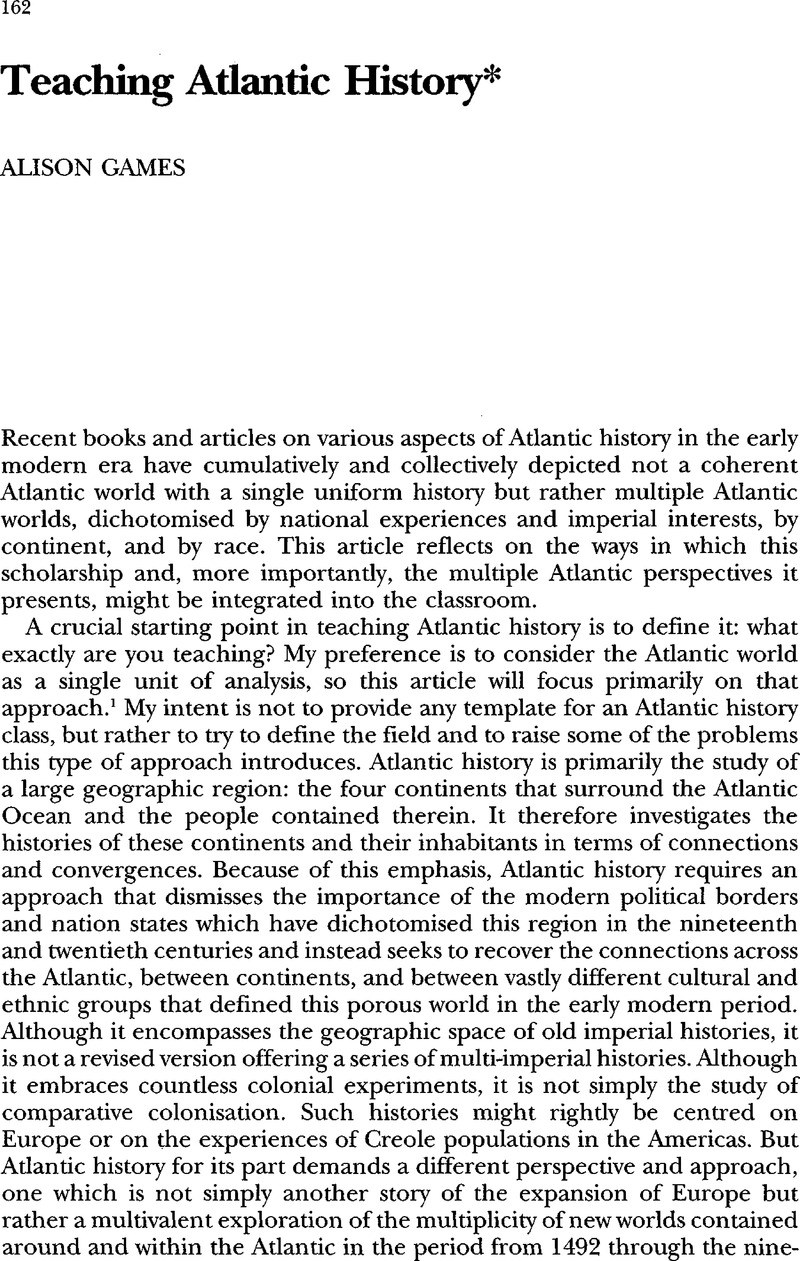Article contents
Teaching Atlantic History*
Published online by Cambridge University Press: 22 June 2011
Abstract

- Type
- Round Table Conference: The Nature of Atlantic History
- Information
- Copyright
- Copyright © Research Institute for History, Leiden University 1999
References
Notes
1 I am especially indebted to Karras, Alan, ‘Introduction’ in: Karras, Alan and McNeill, J.R. eds, Atlantic American Societies: From Columbus through Abolition, 1492–1888 (London 1992) 1–15;CrossRefGoogle ScholarCanny, Nicholas, ‘The British Atlantic World: Working Towards a Definition’, The Historical Journal 33 (1990) 479–497; andCrossRefGoogle ScholarBailyn, Bernard, ‘The Idea of Atlantic History’, Itinerario 20/I (1996) 19–44. See alsoCrossRefGoogle ScholarSteele, Ian K., ‘Exploding Colonial American History: Amerindian, Atlantic, and Global Perspectives’, Reviews in American History 26 (1998) 70–95CrossRefGoogle Scholar.
2 On European migration, see especially Altaian, Ida and Horn, James eds, ‘To Make America’: European Emigration in the Early Modern Period (Berkeley 1991); andGoogle ScholarCanny, Nicholas ed., Europeans on the Move: Studies on European Migration, 1500–1800 (Oxford 1994)CrossRefGoogle Scholar.
3 See especially Crosby, Alfred W. Jr, The Columbian Exchange: Biological and Cultural Consequences of 1492 (New York 1972)Google Scholar; McNeill, William H., Plagues and Peoples (Garden City 1976); andGoogle ScholarCook, Noble David, Born to Die: Disease and New World Conquest, 1492–1650 (Cambridge 1998)Google Scholar.
4 Mancall, Peter, Deadly Medicine: Indians and Alcohol in Early America (Ithaca 1995) especially chapter 2.Google Scholar
5 The phrase the historian Elliott, J.H. used to describe the relationship between England and its colonies is ‘The element of disjunction’, in ‘Final Reflections: The Old World and the New Revisited’ in: Kupperman, Karen Ordahl ed., America in European Consciousness, 1493–1750 (Chapel Hill 1995) 401Google Scholar.
6 For a discussion of this theory, see Quinn, David B., England and the Discovery of America, 1481–1620 (New York 1973) chapter 1Google Scholar.
7 See Canny, Nicholas, ‘England's New World and the Old, 1480s–1630s’ in: Canny, Nicholas ed., The Origins of Empire (Oxford 1998) 164.Google Scholar
8 Gemery's, Henry A., ‘Emigration from the British Isles to the New World, 1630–1700: Inferences from Colonial Populations’, Research in Economic History 5 (1980) 212.Google Scholar The colonial population grew over five-fold from 9500 in 1630 to 53,700 in 1640. The next largest leap transpired between 1640 and 1650, when the colonial population grew by fifty-five per cent.
9 Games, Alison, Migration and the Origins of the English Atlantic World (Cambridge and London 1999) Introduction.Google Scholar
10 Knapp, Jeffrey, An Empire Nowhere: England, America, and Literaturefrom Utopia to the Tempest (Cambridge 1992) Introduction.Google Scholar
11 Salisbury, Neal, Manitou and Providence: Indians, Europeans, and the Making of New England, 1500–1643 (Oxford 1982) 101–106, quotation from 103.Google Scholar
12 Question raised by the organizers of the Itinerario conference, May 1999.
13 I base this assessment on a study of the packet of syllabi assembled by Pat Denault of the Charles Warren Center at Harvard University for the conference on Teaching Adantic History, on examinations of history department course offerings, and on conversations with colleagues at other institutions.
14 Perspectives 37/5 (May 1999) 33Google Scholar
15 David Armitage, ‘The Worm's Eye View’, delivered at Teaching Atlantic History, a conference organised by the International Seminar on the History of the Atlantic World, Harvard University, November 1998. My thanks to Professor Armitage for permission to raid his talk so liberally.
16 I am also indebted to Mark Peterson for reminding me of this important point in his talk, ‘Reflections of a New England Miniaturist: A Sidelong View or, Boy, is that Water Cold’, delivered at Teaching Atlantic History, a conference organised by the International Seminar on the History of the Atlantic World, Harvard University, November 1998.
17 Thornton, John, ‘“I am the Subject of the King of Kongo”: African Political Ideology and the Haitian Revolution’, Journal of World History 4 (1993) 181–214.Google Scholar
18 Fick, Carolyn, ‘The Haitian Revolution in an Atlantic Context’ in: Pritchard, James ed., Proceedings of the Nineteenth Meeting of the French Colonial Historical Society (Cleveland 1994) 140.Google Scholar My thanks to Julie Hardwick for calling my attention to this article.
19 I have explored this question in Games, Alison, ‘History without Borders: Teaching American History in an Atlantic Context’, Indiana Magazine of History 41 (1995) 159–178Google Scholar.
20 David Lowenthal of University College London addressed this problem of history versus heritage in a letter published in Perspectives 32/1 (January 1994) 17–18Google Scholar.
- 6
- Cited by




